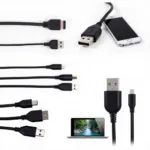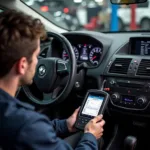Understanding the nuances of automotive electrical systems can feel like navigating a labyrinth. One such head-scratcher for many car enthusiasts is the compatibility between an OBD2 harness and an OBD1 alternator. While the prospect might seem daunting, this guide aims to demystify the process, equipping you with the knowledge to make informed decisions about your vehicle’s electrical system.
Understanding the Basics: OBD1 vs. OBD2
Before delving into the specifics of connecting an OBD2 harness to an OBD1 alternator, it’s crucial to grasp the fundamental differences between OBD1 and OBD2 systems.
OBD, short for On-Board Diagnostics, refers to a vehicle’s self-diagnostic and reporting capability. OBD1, prevalent in cars manufactured before 1996, utilized a rudimentary system with limited diagnostic capabilities. OBD2, implemented in 1996 and later models, brought a standardized system with enhanced diagnostic capabilities and a universal connector.
The shift from OBD1 to OBD2 also brought changes to various components, including alternators. OBD2 alternators typically feature different connectors and wiring configurations compared to their OBD1 counterparts.
Can You Connect an OBD2 Harness to an OBD1 Alternator?
The short answer is: it depends. While directly plugging an OBD2 harness into an OBD1 alternator isn’t feasible due to differing connector types, achieving compatibility is possible with some modifications.
The key lies in understanding the wiring schematic of both your OBD2 harness and OBD1 alternator. In most cases, you’ll need to splice and connect the corresponding wires from the OBD2 harness to the OBD1 alternator’s terminals.
Precautions and Considerations
Attempting to connect an OBD2 harness to an OBD1 alternator without proper knowledge can lead to electrical malfunctions and potentially damage your vehicle’s electrical system. Here are some crucial factors to consider:
- Wiring Diagram: Obtain the correct wiring diagrams for both your OBD2 harness and OBD1 alternator. This will guide you in identifying the corresponding wires for connection.
- Professional Assistance: If you’re not comfortable working with automotive electrical systems, seeking assistance from a qualified mechanic is highly recommended.
- Voltage Regulator: Determine whether your OBD1 alternator utilizes an internal or external voltage regulator. This information is crucial for ensuring proper voltage regulation and preventing electrical issues.
- Grounding: Ensure proper grounding of both the alternator and the harness to prevent electrical shorts and ensure optimal performance.
Advantages and Disadvantages
Connecting an OBD2 harness to an OBD1 alternator might seem like a cost-effective solution, but it’s essential to weigh the advantages and disadvantages:
Advantages:
- Cost Savings: Utilizing an existing OBD1 alternator can be more budget-friendly than purchasing a new OBD2 compatible unit.
- Parts Availability: OBD1 alternators might be more readily available for older vehicle models.
Disadvantages:
- Complexity: Modifying the wiring requires electrical knowledge and can be challenging for those unfamiliar with automotive electrical systems.
- Potential Issues: Incorrect wiring can lead to charging problems, electrical malfunctions, and potential damage to your vehicle’s electrical components.
When to Consider an OBD2 Harness to OBD1 Alternator Connection
Connecting an OBD2 harness to an OBD1 alternator is typically considered in specific scenarios:
- Engine Swaps: When swapping an older engine with an OBD1 alternator into a vehicle with an OBD2 harness.
- Classic Car Restorations: Enthusiasts restoring classic cars with updated electrical systems might opt for this approach.
Alternatives to Consider
Instead of connecting an OBD2 harness to an OBD1 alternator, exploring alternative solutions is often a safer and more reliable approach:
- OBD2 Alternator Upgrade: Upgrading to an OBD2 compatible alternator eliminates the need for wiring modifications and ensures seamless compatibility.
- Adapter Harnesses: In some cases, adapter harnesses specifically designed for connecting OBD2 harnesses to OBD1 alternators might be available. However, it’s crucial to source these from reputable manufacturers.
Conclusion
While connecting an OBD2 harness to an OBD1 alternator is technically feasible, it involves inherent complexities and potential risks. Carefully assessing your vehicle’s specific needs, your technical expertise, and the availability of alternative solutions is crucial before embarking on this endeavor.
Remember, your vehicle’s electrical system is a complex network. When in doubt, seeking guidance from experienced mechanics or automotive electricians is always recommended to ensure the safety and optimal performance of your vehicle.
Frequently Asked Questions (FAQs)
Can I use an OBD1 alternator in an OBD2 car?
While not directly plug-and-play, you can connect an OBD1 alternator to an OBD2 car with wiring modifications. However, it’s essential to consider the complexities and potential risks involved.
What happens if I connect the wrong wires?
Incorrect wiring can lead to a range of issues, including charging system failure, damage to electrical components, and even fire hazards. Always double-check your connections against the wiring diagram.
Is it better to upgrade to an OBD2 alternator?
In most cases, upgrading to an OBD2 alternator offers a more straightforward and reliable solution, ensuring compatibility and minimizing the risk of electrical problems.
Where can I find a reliable wiring diagram?
You can often find wiring diagrams in your vehicle’s service manual or through reputable online resources.
Do I need any special tools for the wiring modification?
You’ll need basic electrical tools like wire strippers, crimpers, heat shrink tubing, and electrical tape.
Can I do this myself, or should I consult a mechanic?
If you’re unfamiliar with automotive electrical systems, it’s best to consult a qualified mechanic to avoid potential mistakes and ensure safety.
What are the signs of alternator problems?
Common signs of alternator issues include dimming headlights, flickering dashboard lights, slow engine cranking, and a warning light on the dashboard.
Need further assistance with your OBD2 harness and OBD1 alternator connection? Don’t hesitate to reach out to our team of experts. We’re available 24/7 via WhatsApp at +1(641)206-8880 or email us at [email protected].
For more information on OBD systems and related topics, explore our comprehensive resources available on OBDFree. You can also find helpful guides on honda obd2 to obd1 alternator wiring for specific vehicle models.

